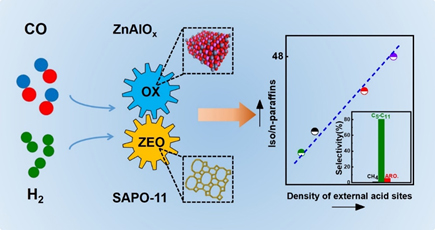Recently, a research team led by Prof. Xiulian Pan and Prof. Xinhe Bao from the Dalian Institute of Chemical Physics (DICP) of the Chinese Academy of Sciences (CAS) has made new progress in the direct synthesis of gasoline from syngas. Isoparaffin-rich gasoline has been selectively synthesized using the OXZEO catalyst. The active sites of isoparaffin formation were elucidated, which provided an important guidance for the one-step synthesis of high-quality gasoline from syngas.
Syngas is a key platform for the utilization of carbon resources including coal, natural gas, and biomass. The key to syngas chemistry lies in the controlled C-C coupling toward desired products without forming byproducts, which remains a challenge. The team of Prof. Xiulian Pan and Prof. Xinhe Bao reported a new catalyst concept based on metal oxide-zeolite bifunctional catalysts (OXZEO), and it enables direct conversion of syngas to a variety of chemicals and fuels with high selectivity, such as light olefins, ethylene, gasoline, aromatics and oxygenates, etc. The OXZEO concept provides a new technology platform for highly efficient utilization of coal and other carbon resources (Chem. Rev. 2021, 121, 6588-6609).

With the diminishing petroleum reserves and its fluctuating prices, there is an urgent quest to develop new technology for liquid fuel production. The vital part of the catalyst design is developing a novel catalyst with high selectivity, especially high isoparaffins selectivity and good stability. Based on the previous work (Angew. Chem., Int. Ed. 2019, 58, 7400-7404), the team achieved 34% CO conversion and 82% gasoline selectivity by modulating the acid sites distribution of zeolite, in which the iso/n-paraffins ratio is as high as 38. By optimizing the reaction conditions, the ratio of iso/n-paraffins can reach as high as 48. This is the highest value of the iso/n-paraffins ratio reported so far. A 150 h time on stream test of the catalyst indicates rather good stability. Further studies show that the external acid sites of the zeolite could be the active sites for the formation of branched, especially the multi-branched isoparaffins. This study provides an important guidance for the one-step synthesis of high-quality gasoline from syngas and even CO2.
This work was published in ACS Energy Letters with the title “Direct synthesis of isoparaffin-rich gasoline from syngas”. The work was supported by the Ministry of Science and Technology of China, the National Natural Science Foundation of China, Dalian High-level Talent Innovation Program, the Youth Innovation Promotion Association of Chinese Academy of Sciences. (Text/Picture by Jingyao Feng)
Article link: https://doi.org/10.1021/acsenergylett.2c00467